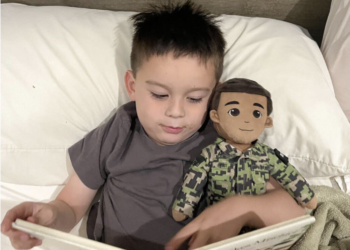It’s a typical Wednesday afternoon and you get the “I have some news” text. This text is often followed by unwelcome information, but the moment the word “deployment” is thrown into the mix, you feel shattered.
It’s more than just worrying about the safety of your loved one. It’s the stress of the unknown and feeling like time is being lost for months to come.
Whether your spouse’s first deployment happens 10 days or 10 years into your marriage, coping with it will be a roller coaster of emotions. Many military spouses fear it will negatively impact their relationship. Luckily, there are a few things you can do to help avoid that.
As a social psychology Ph.D. with a background in adult attachment and romantic relationships, I have three psychology-informed tips for helping you cope during your spouse’s first deployment.
Accept the ups and downs — it’s OK not to be OK
Your feelings will fluctuate and that’s totally normal. Be real and open about your emotions with your partner and others. How you feel is one thing; how you react to those feelings is another.
As with any new situation, there will typically be a honeymoon phase. That phase will likely be followed by a period of frustration, eventually moving into acceptance and feeling like the situation is “the norm.” This is known as the U-Curve theory, and it’s how most people experience emotions when it comes to big changes. Science says it’s totally normal, so there is no shame in experiencing these feelings.
Talk openly about your struggles with your friends and family and discuss your frustrations (within reason) with your spouse. Just remember that your spouse can’t do anything to change the circumstances. When others seem willing to let you freely work through your emotions, that can feel very helpful.
Try doing a weekly self check-in as a way of navigating your feelings. Stay aware of your highs and lows in an effort pinpoint what triggers each and allow you to work through them.
Use the time to expand yourself — your relationship will thank you
One of the best things you can do to cope during your spouse’s first deployment is to set a personal goal to work toward while they’re away. Take a new class, train for an athletic event, or even start a project around the house. Once you choose your goal, give your spouse weekly updates and reward yourself for sticking with it.
Doing this can help you feel accomplished, and it may also help your partner feel better about being away, knowing that you aren’t just “sitting around waiting.” Make this time work for you and do something positive with it rather than dwelling on it. Remember: it’s okay to make memories on your own and do things for yourself.
Experiencing personal growth as a result of achieving a goal makes you more likely to do things to improve your relationship. You’re also more likely to be more flexible when it comes to forgiveness and working to bounce back from temporary setbacks. This ultimately can help maintain a healthy relationship during deployment and beyond.
Make expectations clear — communicate intentionally
Having clear expectations is a great way to reduce anxiety in situations that are new. For example, not knowing when you’ll be able to talk may feel like a threat to your relationship, which can cause anxiety.
The unknown of deployments can be really uncomfortable and cause a lot of troubling feelings. In order to mitigate these feelings, make a plan for when and how often you’ll communicate — to whatever extent you and your service member are able. Doing this can help you to feel more at ease with the unknown.
Your communication plan may have to change from week to week, but taking the time to chat with your partner about what each week might look like can help ease some of your feelings of anxiety. Try to plan two set communication days and windows of time for a phone or video call. If you’re able to squeeze in more, then look at that as a bonus.
During these set times, be sure to communicate with intention. Talk about any struggles you may be having first, then share some positive takeaways from the week, and end with casual chit-chat. Leaving things unsaid can eat away at you in the quiet hours when you can’t communicate, so be sure to say what needs to be said.

































